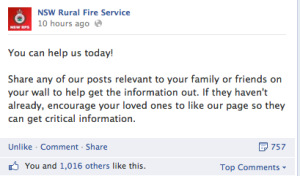I have always argued that corporations and their pursuit of profit is largely damaging to society socially and environmentally. Particularly in light of the recent community support against sledge dumping in the Great Barrier Reef. However without Mark Zuckerberg’s ingenious corporation Facebook would we indeed have been able to galvanise such support as effectively? These three academics discuss their view on the pursuit of economic growth.
- Dr Chris Dey, Senior Researcher (Physics) at the University of Sydney believes the world’s fundamental physical limits come before economic limits with economic growth ‘the strongest doctorate in society, more so than religion’.
- Dr Vandana Shiva is an Indian environmental activist that focuses on ‘Gross National Happiness’ as opposed to ‘Gross World Product’. Dr Shiva questions the popularity of the term GDP and believes it to be more reflective of ‘an abstract number that can destroy everything that is real that sustains us socially and ecologically and it measures everything except that which makes life worthwhile’. Dr Shiva discusses how debt in India is pushing farmers to commit suicide with ‘annihilation of life the consequence of growth…the multiplication of money to mobilise others and not all’.
- Durkheim argues that contemporary work societies, otherwise now known as market societies focus on organic forms of solidarity which ‘foster a sense of disconnection and alienation’ associated with higher rates of suicide.
However, when you begin to unravel the complexities of the economy you can deduce that corporations do also increase social capital. It sounds outlandish I know, even for me…
- Ross Gittins, Senior Economics Editor for the Sydney Morning Herald discussed how reduced consumption can also reduce employment and this in itself creates a dysfunctional society at a recent Sustainability forum. Obama asks major corporates in the US to create jobs to curb their unemployment rate.
- For centuries work has been vital in organising millions of people and minimising the impact of anti-social behaviour. Unilever alone has created jobs for over 200,000 people worldwide.
- Through creating favourable policies for transnational corporations Singapore was able to increase real income and employment with an increase in public revenues resulting in increased expenditure on health, housing and education (Hobson & Ramesh 2010). Singaporeans saw the stable global economy that had been constructed critical to increased social capital and the State was favoured by most (Hobson & Ramesh 2010).
- Galbraith discusses the positive attributes of consumption with many products enabling good health, happiness, social achievement or improved community standing (Galbraith 1972). Over 95% of households in the UK, Canada, Indonesia and Vietnam use Unilever products each year (Roach 2005).
Interestingly, at the recent Sustainability Forum by Collaborate Lab on Collaborative Consumption, Air BNB and Garage Sale Trail propose their sustainable business models around reuse and recycling. It is evident though that the two Managing Directors of both organisations are happy to use the commercial acumen and sound profit making business models acquired from those corporations with which they condemn!
The World Trade Organisation is responsible for determining the rules governing international trade but is renowned for its ‘free trade committment’ (Stilwell 2012). The State can impose tighter regulations on the market but often its the State that relies on the market in achieving a fully functioning society. For example, the NSW Government’s re brand to ‘NSW Now, the new State of Business’ with the aim to attract international investment to build the infrastructure required to sustain employment.
The solution could be to impose tighter restrictions on trade but what about the rules the State places on society like the new 1:30am lock out rule to reduce alcohol fuelled violence? When do we ever follow all the rules imposed on us anyway! Should corporates be expected to as well?
An example of the market overthrowing Government policy was the mining tax proposed in 2010 to curb ‘super profits’, which mining companies retaliated through political advertising resulting in the tax becoming only a modest reform. In contrast, in 2012, Australia’s Health Minister announced the plain packaging policy to reduce tobacco related issues (SMH 2014). Large global tobacco companies invested heavily in advertising and other tactics but were unsuccessful in overturning this policy, demonstrating the resilience required by policy makers in serving the best interests of citizens as oppose to corporations.
The challenge is to ‘engineer a new balance between market and society, one that will continue to unleash the creative energies of private entrepreneurship without eroding the social basis of cooperation’ (Guillen 2001). From the detrimental health impacts tobacco firms perpetuate to the life saving medicines developed by pharmaceutical firms, society has faced challenges for centuries and it seems there is valid place in society for corporations after all.




